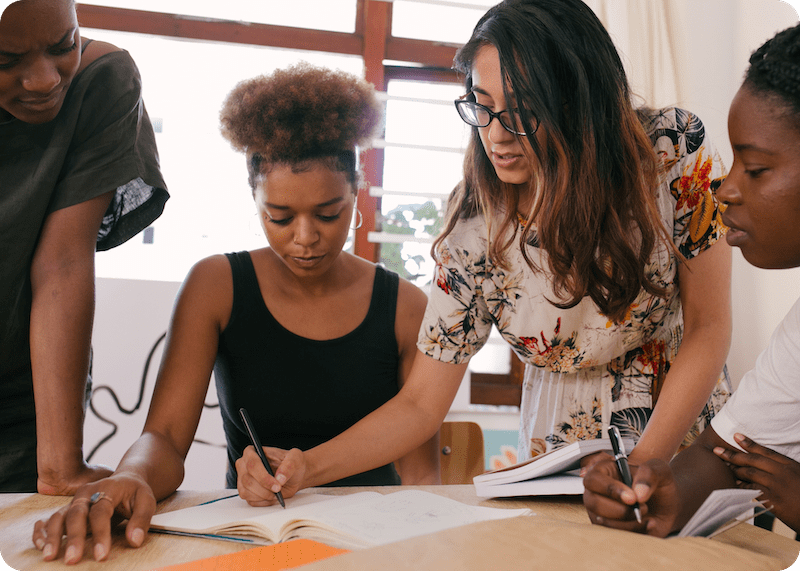
These past couple years, many of us appreciated the heightened focus on racial equity in our culture, society, and organizations. It’s true there’s still a lot of work to do. But more and more organizations are considering what it means to operationalize equity through tools like DEI coaching, marking a monumental shift from “talk” to “action.”
At a)plan, so much of what we do centers around our mission to operationalize equity. From our Diversity, Equity, and Inclusion work (DEI coaching), to our internal conversations, to our diversity commitment, we are working to build a future where equity is tightly woven into the fabric of more and more organizations.
We recognize that DEI coaching and operationalizing equity are newer concepts to many people. This post helps explain what they are, why they’re important, and how anyone can take steps to do their own part to operationalize equity. We also offer some DEI tips that you can quickly put to action at your own company.
What is DEI Coaching?
DEI coaching is a form of coaching for individuals and teams aiming to strengthen their commitment to diversity, equity, and inclusion. DEI coaching gives participants new skills, vocabulary, and best practices that help foster DEI—and an immediate space in which to practice those skills.
DEI coaching can be delivered in a one-to-one format, or in a team format by seasoned a)plan coaches. Organizations investing in a well-run DEI coaching program can expect to see meaningful improvements in employee performance, engagement, retention, and overall company culture.
What Is Operationalizing Equity?
Operationalizing equity can be defined as the process of adopting ways to systematically embrace more racial and social equity in the ways we work and live. In many respects, operationalizing equity is the opposite of a “band-aid” solution. It’s about creating new, long-lasting systems that allow for equity to take root and permeate throughout organizations and society as a whole.
DEI Tips for Operationalizing Equity
The concept of operationalizing equity is perhaps best explained through some DEI tips and examples. Let’s consider what operationalizing equity might look like in the context of an organization striving to improve its systems around employee engagement and belonging.
There’s no shortage of practices that could help an organization better operationalize equity. Especially for companies that are just starting to pay more attention to these issues, some initial tweaks could make a big difference. A few DEI tips include:
DEI Tip: Establish an unwavering commitment to DEI at the executive level and document that commitment in your company’s core values.
DEI Tip: Create new communication channels and processes to ensure every voice in the room is considered.
DEI Tip: Give under-represented employees (UREs) a safe space to discuss challenges, understanding that UREs face a unique set of challenges in the workplace.
Entire posts could be written around the how for each of these example DEI tips. But for an increasing number of companies, DEI coaching is exactly how equity is operationalized in effective, sustainable ways.
These examples aim to chip away at decades-long shortcomings that particularly afflict UREs. And note that addressing these issues is not only the right thing to do from an ethics perspective, but also from a business perspective. Research and studies support the fact that better representation and support for UREs leads to higher retention, more employee fulfillment, and increased innovation.
Common Topics Covered in DEI Coaching
As with any coaching engagement, the specific areas of focus will be unique to the individual or the organization. That’s why customizability is such a key part of picking a coaching provider—organizations with specific desired outcomes shouldn’t settle for “cookie-cutter” programs. That said, in our experience at a)plan, DEI-focused coaching engagements tend to cover some of the following highlights:
- Reflecting on the vast array of identity groups and identity differences
- Awareness around dominant vs. non-dominant identity groups
- Understanding the concept and impact of stereotype threat
- Learning tools to have courageous, sometimes uncomfortable conversations
- How micro-aggressions lead to macro struggles, and how to improve this pattern
While some of these topics are familiar to people even before starting with a coach, survey feedback has proven to us that there is always something valuable to learn. And when an entire organization is learning at the same time, companies see big strides in their efforts to operationalize equity.
DEI Coaching as a Strategy for Operationalizing Equity
To any organizations or individual changemakers advancing the important work in this space, we commend you for taking action. The time is now to embrace new (and often overdue) practices that serve to support a wider breadth of individuals.
We’re curious to know—how are you and/or your company operationalizing equity? At a)plan, even as a company that specializes in this work, the learning never stops. Whether you have some awesome ideas or are looking for some yourself, please don’t hesitate to get in touch.

